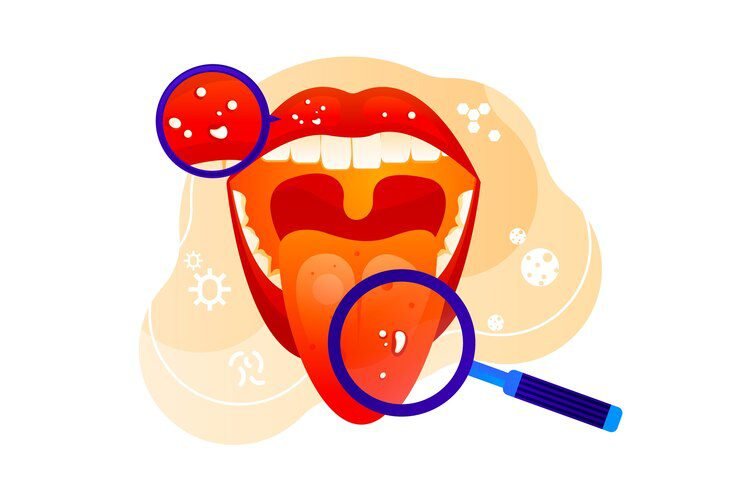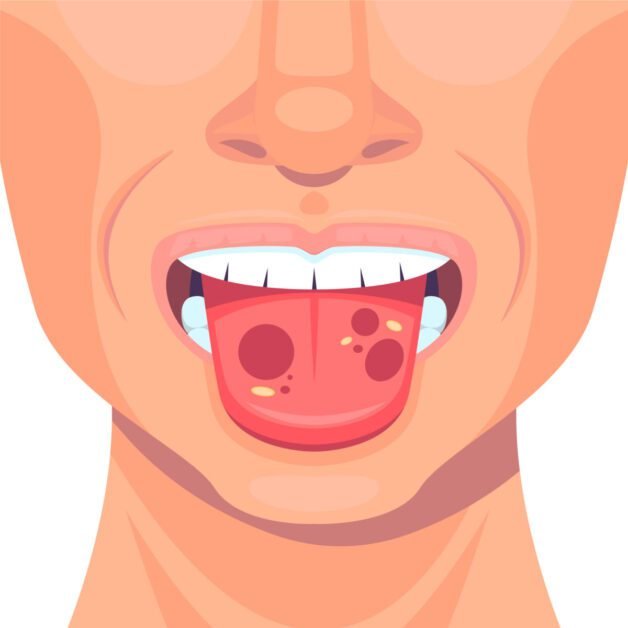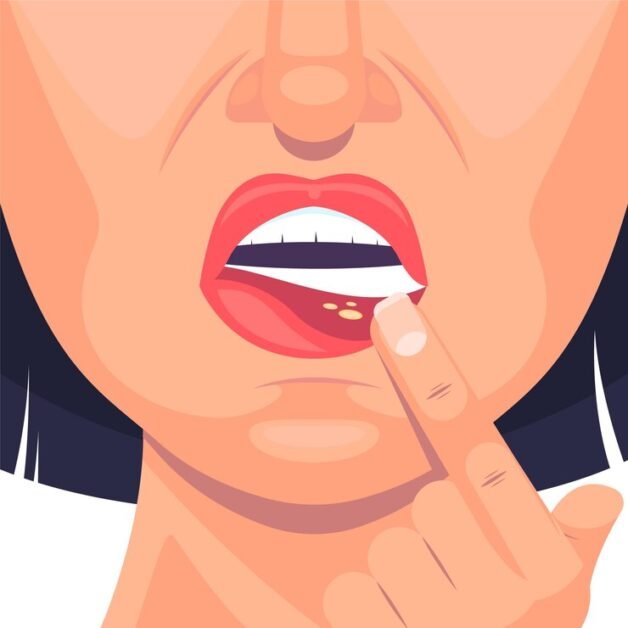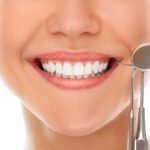Table of Contents
Causes of Canker Sores

Canker sores, also known as aphthous ulcers, are small, painful lesions that form inside the mouth. While the exact cause of canker sores is unknown, several factors have been identified that may contribute to their development. One possible cause is tissue injury, such as accidental biting of the cheek or tongue. Other potential triggers include stress and hormonal changes, which may explain why canker sores are more common during times of increased emotional or physical stress, as well as in women during their menstrual cycle. Certain foods, such as citrus fruits, spicy or salty foods, and foods high in acidic content, have also been known to trigger canker sores in some individuals. Additionally, nutritional deficiencies, particularly in iron, vitamin B12, and folic acid, have been associated with an increased risk of developing canker sores. While these factors can contribute to the formation of canker sores, it is important to note that each individual may have their own unique triggers.
Canker sores are a common occurrence and can affect individuals of all ages. They can be incredibly uncomfortable and may interfere with eating, drinking, and speaking. Understanding the various causes of canker sores is crucial in managing and preventing their occurrence. By identifying potential triggers, individuals may be able to make necessary lifestyle adjustments and take proactive steps to reduce the frequency and severity of canker sores. It is important to consult with a healthcare professional or dentist to accurately diagnose canker sores and develop an appropriate treatment plan tailored to individual needs.
Symptoms and Signs of Canker Sores

Canker sores, also known as aphthous ulcers, can be uncomfortable and painful. The most common symptom of a canker sore is a round or oval-shaped lesion that develops inside the mouth, typically on the inside of the cheeks or lips. These sores are usually white or yellowish in color, with a red border surrounding the affected area.
In addition to the visible sore, individuals with canker sores may experience other symptoms. These can include a tingling or burning sensation before the sore appears, as well as difficulty in eating or talking due to the sore’s location. Some individuals may also experience swollen lymph nodes, fever, or general feelings of malaise.
If you notice these symptoms or suspect you may have a canker sore, it is important to have it examined by a healthcare professional. While canker sores typically resolve on their own within one to two weeks, a dentist or doctor can provide a proper diagnosis and recommend appropriate treatment options to alleviate discomfort and promote healing.
Types of Canker Sores

Aphthous ulcers, commonly known as canker sores, are a painful condition that affects the oral mucosa. These lesions can be further classified into three different types based on their characteristics and location within the mouth.
The first type is called minor aphthous ulcers. These are the most common form of canker sores and account for approximately 80% of cases. Minor ulcers are small, round or oval-shaped lesions with a white or yellowish center surrounded by a red halo. They typically measure less than 1 centimeter in diameter and can be found on the inner cheeks, tongue, and gums.
The second type of canker sores is major aphthous ulcers. These are larger and more painful than minor ulcers, measuring more than 1 centimeter in diameter. Major ulcers often have irregular shapes and deeper borders. They can persist for several weeks or even months and are commonly located on the tongue, lips, or soft palate.
The third type is called herpetiform aphthous ulcers. Despite their name, these ulcers are not related to the herpes virus. Instead, they are characterized by clusters of tiny, pinpoint-sized ulcers that merge together to form larger ones. Herpetiform ulcers can be extremely painful and may take up to two weeks to heal. They tend to occur on the tongue, gums, and inside the cheeks.
Understanding the different types of canker sores is essential for proper diagnosis and treatment. While minor ulcers usually heal on their own within a couple of weeks, major and herpetiform ulcers may require medical intervention to alleviate pain and promote healing.
Diagnosing Canker Sores
To accurately diagnose canker sores, a healthcare professional will typically start by conducting a thorough examination of the affected area. They will closely examine the sores and may ask you about any symptoms you have been experiencing, such as pain or discomfort. It is important to provide the healthcare professional with detailed information about your medical history and any medications you may be taking, as these factors can sometimes contribute to the development of canker sores.
In some cases, further tests may be necessary to rule out other possible causes or to confirm the diagnosis. These tests may include laboratory tests, such as a biopsy, in which a small sample of tissue is taken from the sore and examined under a microscope. Additionally, blood tests may be conducted to check for underlying medical conditions that could be contributing to the development of the sores.
It is crucial to consult with a healthcare professional for an accurate diagnosis and appropriate treatment plan. Self-diagnosis can be challenging, as canker sores can resemble other oral conditions. Seeking professional guidance will ensure proper management of the condition and alleviate any discomfort associated with canker sores.
Here’s a table summarizing the diagnosis of canker sores along with credible sources:
| Diagnosis Step | Description | Credible Source |
|---|---|---|
| Medical History and Examination | The healthcare provider will review the patient’s medical history and conduct a physical examination to assess the appearance and location of the canker sores. | Mayo Clinic: Link |
| Visual Inspection | Canker sores typically present as small, round or oval ulcers with a white or yellow center and a red border. The healthcare provider will visually inspect the sores. | American Academy of Dermatology (AAD): Link |
| Differential Diagnosis | The healthcare provider will rule out other conditions that may resemble canker sores, such as oral herpes, oral thrush, or autoimmune diseases like lupus. | American Academy of Oral Medicine (AAOM): Link |
| Biopsy (if necessary) | In rare cases, a biopsy may be performed to confirm the diagnosis, especially if the sores are persistent, large, or present with unusual features. | National Institute of Dental and Craniofacial Research (NIDCR): Link |
Complications Associated with Canker Sores
Canker sores, also known as aphthous ulcers, are small, shallow lesions that form on the soft tissues inside the mouth. While they are usually harmless and tend to heal on their own within one to two weeks, there can be some complications associated with these bothersome sores.
One potential complication is infection. When a canker sore occurs, it leaves an open wound in the mouth. This can make it susceptible to bacterial or viral infections, such as oral thrush or herpes simplex virus (HSV) infection. An infected canker sore may exhibit symptoms such as increased pain, swelling, redness, or the presence of pus. If you suspect that your canker sore is infected, it is important to seek medical attention to prevent further complications.
Another complication that can arise from canker sores is difficulty with eating and speaking. The presence of these painful ulcers in the mouth can make it uncomfortable or even painful to chew, swallow, or speak. This can potentially lead to poor dietary intake, inadequate nutrition, and weight loss. In severe cases, the pain from canker sores may even interfere with normal daily activities and negatively impact a person’s quality of life.
Treatment Options for Canker Sores
Canker sores, also known as aphthous ulcers, can be quite uncomfortable and painful. Fortunately, there are several treatment options available that can help alleviate the symptoms and promote healing.
One common treatment for canker sores is the use of over-the-counter (OTC) medications. These usually come in the form of gels or ointments that can be directly applied to the affected area. These products often contain ingredients such as benzocaine or lidocaine, which provide temporary relief by numbing the sore and reducing pain.
In addition to OTC medications, there are also prescription medications that your dentist or doctor may recommend for more severe or recurrent canker sores. These can include mouth rinses or oral corticosteroids, which can help reduce inflammation and speed up the healing process. It is important to consult a healthcare professional before trying any prescription medications to ensure they are appropriate for your specific situation.
While treatment options can provide relief, it is important to remember that canker sores usually heal on their own within 1 to 2 weeks. However, if you experience severe or persistent symptoms, it is recommended to seek medical attention to rule out any underlying conditions and receive appropriate treatment.
Over-the-Counter Remedies for Canker Sores
Over-the-Counter Remedies for Canker Sores:
When it comes to finding relief for canker sores, over-the-counter remedies can be a convenient and accessible option. These remedies are readily available at pharmacies and drugstores, allowing individuals to take control of their discomfort without a prescription. While they may not be a cure for canker sores, they can help alleviate symptoms and promote healing.
One popular over-the-counter remedy for canker sores is topical ointments or gels. These products often contain ingredients such as benzocaine, lidocaine, or hydrogen peroxide, which can help numb the area and provide temporary relief from pain. Additionally, some ointments may contain ingredients like menthol or camphor, which can provide a soothing sensation and reduce inflammation. It is important to follow the instructions provided on the packaging and avoid using these products for an extended period without consulting a healthcare professional.
Prescription Medications for Canker Sores
Prescription medications can be an effective option for treating canker sores, especially when over-the-counter remedies don’t provide sufficient relief. These medications are typically prescribed by a dentist or healthcare professional, taking into account the severity and frequency of the canker sores.
One commonly prescribed medication is a topical steroid gel or ointment, such as triamcinolone acetonide. This medication helps reduce inflammation and pain associated with canker sores. It is applied directly to the affected area and usually provides quick relief. Another option is a topical antibiotic ointment, like chlorhexidine gluconate, which helps to prevent secondary infections and promote healing. These medications can be particularly beneficial for individuals with extensive or recurrent canker sores.
In more severe cases, oral medications may be prescribed. Examples include corticosteroid pills, such as prednisone, which help reduce inflammation throughout the body, including the canker sores. Additionally, immunosuppressive medications like colchicine or dapsone may be used to suppress the activity of the immune system, reducing the occurrence and severity of canker sores. These oral medications are typically reserved for individuals with severe or persistent canker sores, as they may have more potential side effects.
It is important to consult with a healthcare professional before starting any prescription medication for canker sores. They will be able to assess your individual condition, provide proper guidance, and monitor your progress throughout the treatment.
Natural Remedies for Canker Sores
Canker sores, also known as aphthous ulcers, can be quite painful and discomforting. While they typically heal on their own within one to two weeks, natural remedies can help alleviate the pain and promote faster healing. One common natural remedy is rinsing the mouth with salt water. This can help reduce inflammation and disinfect the area, providing relief from pain. Another natural option is applying aloe vera gel directly to the canker sore. Aloe vera has soothing properties that can help reduce pain and inflammation. Additionally, using a mouth rinse made with chamomile tea can have a calming effect on the sore, aiding in the healing process.
It is important to note that natural remedies may not work for everyone, and results may vary. If your canker sores persist or become increasingly painful, it is recommended to consult with a healthcare professional for proper diagnosis and treatment options. Natural remedies should complement, not replace, medical advice.
Preventing Canker Sores
Maintaining good oral hygiene is crucial in preventing canker sores. This includes brushing your teeth twice a day, using a soft-bristled toothbrush and fluoride toothpaste. Pay attention to your technique, ensuring that you clean all surfaces of your teeth and gums thoroughly. Don’t forget to replace your toothbrush every three to four months, or sooner if the bristles become frayed.
In addition to regular brushing, it’s important to floss daily to remove plaque and food particles from between your teeth. This helps to prevent irritation and reduce the risk of canker sores. Consider using an antimicrobial mouthwash as part of your oral hygiene routine, as it can help to kill bacteria and promote overall oral health. Lastly, having regular dental check-ups and cleanings is essential for preventing and detecting any oral health issues, including canker sores. Your dentist can provide personalized recommendations and advice to help you maintain optimal oral hygiene and prevent canker sores.
Factors that Increase the Risk of Canker Sores
Canker sores are painful ulcers that form inside the mouth, specifically on the soft tissues such as the inside of the cheeks, lips, and tongue. These sores can occur in people of all ages, but certain factors can increase an individual’s risk of developing them.
One factor that increases the risk of canker sores is a family history of these ulcers. Research suggests that there may be a genetic component to canker sores, as they tend to run in families. Therefore, individuals with a family history of canker sores are more likely to develop them themselves.
Additionally, certain dietary factors can increase the risk of canker sores. For example, consuming acidic or spicy foods has been associated with an increased likelihood of developing these ulcers. Likewise, deficiencies in certain vitamins and minerals, such as vitamin B12, iron, zinc, and folic acid, can also contribute to the development of canker sores.
Stress has long been recognized as a trigger for various oral health issues, including canker sores. When the body is under stress, the immune system can become compromised, making it easier for canker sores to form. Moreover, individuals who experience frequent traumatic injuries to the mouth, such as accidental bites or irritation from dental appliances, are more prone to developing canker sores.
Lastly, hormonal changes have also been linked to an increased risk of canker sores. Women, in particular, may experience more frequent outbreaks during certain stages of their menstrual cycle or during pregnancy.
While these factors may increase the risk of canker sores, it is important to remember that each individual’s experience may vary. It is always a good idea to consult with a healthcare professional, such as a dentist or doctor, to discuss any concerns or questions about canker sores and their potential risk factors.
Canker Sores vs Cold Sores: What’s the Difference?
Canker sores and cold sores are two distinct oral conditions that often cause confusion due to their similar appearances and symptoms. Understanding the differences between the two is essential for proper diagnosis and treatment.
Canker sores, also known as aphthous ulcers, are small, shallow, painful sores that develop on the inside of the mouth, including the gums, cheeks, tongue, and roof of the mouth. They can be white or yellow in color with a red border and are not contagious. While the exact cause of canker sores is unknown, factors such as stress, certain foods, oral trauma, and hormonal changes have been associated with their development. Canker sores typically heal within one to two weeks without scarring.
On the other hand, cold sores, also called fever blisters, are caused by the herpes simplex virus (HSV). They are fluid-filled blisters that usually appear on the lips, but can also occur on the chin, nostrils, or other areas of the face. Cold sores are highly contagious and can be transmitted through direct contact with the blister or sharing items like utensils or towels. These sores often begin as a tingling or burning sensation before the blisters form. Cold sores may take longer to heal, generally lasting around two to four weeks.
In conclusion, while both canker sores and cold sores can be uncomfortable and cause oral discomfort, their causes, appearance, and contagiousness differ. Understanding these distinctions can help individuals seek appropriate treatments and take preventive measures to avoid further outbreaks.
Canker Sores in Children: Special Considerations
Canker sores are a common condition that can affect people of all ages, including children. However, there are some special considerations to keep in mind when dealing with canker sores in children.
Firstly, it’s important to note that while canker sores can be painful for anyone, they can be particularly uncomfortable for children. This is because children may have a lower pain tolerance, making even small sores feel more intense. Additionally, children may find it difficult to express their discomfort and may be more prone to irritability or difficulty eating and drinking when they have canker sores.
Secondly, it’s crucial to be mindful of the potential triggers that can cause canker sores in children. These triggers can vary from one child to another, but some common culprits include certain foods and beverages, such as acidic or spicy foods, as well as poor oral hygiene. It’s important to work closely with your child’s dentist or pediatrician to identify and address these triggers in order to prevent further occurrences of canker sores.
By being aware of these special considerations and taking appropriate measures, parents and caregivers can help alleviate the discomfort and minimize the impact of canker sores in children. Stay tuned to the rest of this article where we will explore more about the symptoms, types, and treatment options for canker sores, as well as effective ways to prevent their occurrence in children.
Canker Sores and Oral Hygiene
Maintaining good oral hygiene is crucial for preventing and managing canker sores. The mouth is home to numerous bacteria, and poor oral hygiene can lead to an overgrowth of harmful bacteria, which can contribute to the development of canker sores. Regularly brushing your teeth, flossing, and using mouthwash can help remove bacteria and debris from your mouth, reducing the risk of canker sores.
In addition to practicing good oral hygiene, it is also important to be mindful of the products you use. Some toothpastes and mouthwashes contain harsh ingredients, such as sodium lauryl sulfate (SLS), which can irritate the delicate tissues in the mouth and trigger canker sores. Opting for SLS-free dental products can be beneficial for individuals prone to canker sores. Furthermore, avoiding spicy and acidic foods that can irritate the mouth can also help prevent the development of canker sores. By incorporating these simple habits into your oral hygiene routine, you can significantly reduce the occurrence and severity of canker sores.
Coping with the Pain of Canker Sores
Canker sores can be quite painful and can make everyday tasks such as eating and speaking a challenge. Fortunately, there are several ways to cope with the pain and discomfort they cause.
One of the most effective ways to alleviate the pain of canker sores is by applying a topical numbing gel or ointment. These products contain ingredients, such as benzocaine or lidocaine, which can temporarily numb the area and provide relief. It is important to follow the instructions provided and not exceed the recommended dosage.
Another helpful strategy is to avoid foods and drinks that may irritate the canker sores. Spicy and acidic foods, as well as hot beverages, can exacerbate the pain and prolong the healing process. Opting for softer foods, such as yogurt or mashed potatoes, and sticking to cool or lukewarm beverages can help alleviate discomfort.
Maintaining good oral hygiene can also play a role in managing the pain of canker sores. Gently brushing your teeth with a soft-bristled toothbrush and using a mild, alcohol-free mouthwash can help keep the area clean and prevent infection. Additionally, avoiding oral care products that contain harsh substances, such as sodium lauryl sulfate, can reduce irritation and promote healing.
In conclusion, coping with the pain of canker sores involves using topical numbing agents, steering clear of irritants in food and drink, and maintaining proper oral hygiene. By implementing these strategies, individuals can find relief and aid in the healing process.
When to Seek Medical Attention for Canker Sores
In most cases, canker sores are not a cause for serious concern and can be managed at home with over-the-counter remedies or natural remedies. However, there are certain situations when it is advisable to seek medical attention for canker sores.
If you have recurring canker sores that are large or particularly painful, it is recommended to consult with a healthcare professional. These canker sores may require medical intervention for proper management and relief. Additionally, if your canker sores are accompanied by other worrisome symptoms such as fever, difficulty swallowing, or excessive bleeding, it is important to seek medical attention promptly. These symptoms could indicate an underlying infection or a more serious health condition that needs further evaluation and treatment.
While canker sores often heal on their own within a week or two, seeking medical attention in specific circumstances can help ensure timely and appropriate care, providing relief from discomfort and addressing any underlying issues that may be contributing to the development or persistence of canker sores. Remember, it is always better to err on the side of caution when it comes to your oral health.
What are the common causes of canker sores?
Canker sores can be caused by a variety of factors, including minor mouth injuries, bacterial infections, certain foods or allergies, hormonal changes, stress, and a weakened immune system.
What are the symptoms and signs of canker sores?
Canker sores typically appear as small, shallow ulcers with a white or yellowish center and a red border. They can cause pain or discomfort while eating, drinking, or speaking.
Are there different types of canker sores?
Yes, there are three types of canker sores: minor, major, and herpetiform. Minor canker sores are the most common and usually heal within one to two weeks. Major canker sores are larger and deeper, taking longer to heal. Herpetiform canker sores are clusters of small sores that merge into one large ulcer.
How are canker sores diagnosed?
Canker sores can usually be diagnosed by their appearance and symptoms. In some cases, a healthcare professional may perform a biopsy or order blood tests to rule out underlying medical conditions.
What complications can be associated with canker sores?
While canker sores are generally harmless and resolve on their own, complications such as bacterial infections, excessive pain, or persistent sores may require medical attention.
What are the treatment options for canker sores?
Treatment for canker sores may include over-the-counter remedies such as mouthwashes or gels, prescription medications like corticosteroids, or natural remedies like rinsing with saltwater or applying aloe vera.
Are there any over-the-counter remedies for canker sores?
Yes, there are over-the-counter mouthwashes, gels, and ointments specifically designed to provide relief from canker sores. These products often contain ingredients like benzocaine or hydrogen peroxide.
Do prescription medications exist for canker sores?
Yes, in severe cases or when complications arise, a healthcare professional may prescribe corticosteroid creams, rinses, or pills to reduce inflammation and promote healing.
Are there any natural remedies for canker sores?
Yes, some natural remedies for canker sores include rinsing with saltwater, applying aloe vera gel, using chamomile tea bags as a compress, or taking vitamin supplements like vitamin B12 or zinc.
How can canker sores be prevented?
While there is no foolproof method to prevent canker sores, maintaining good oral hygiene, reducing stress levels, avoiding trigger foods, and getting proper nutrition can help reduce the occurrence of canker sores.
What factors increase the risk of developing canker sores?
Certain factors like family history, hormonal changes, a weakened immune system, certain medical conditions (such as celiac disease or inflammatory bowel disease), and certain medications (such as nonsteroidal anti-inflammatory drugs) can increase the risk of developing canker sores.
What is the difference between canker sores and cold sores?
Canker sores are small ulcerations that occur inside the mouth, while cold sores are fluid-filled blisters that appear on or around the lips. Canker sores are not contagious, whereas cold sores are caused by the herpes simplex virus and can be contagious.
Are there any special considerations for canker sores in children?
Canker sores are common in children and typically resolve on their own. However, if a child has frequent or severe canker sores that interfere with eating or drinking, medical attention should be sought.
How does oral hygiene affect canker sores?
Maintaining good oral hygiene can help prevent canker sores by reducing the risk of mouth injuries and keeping the mouth clean. It is important to brush and floss regularly and use a soft-bristled toothbrush.
How can I cope with the pain of canker sores?
To cope with the pain of canker sores, you can try using over-the-counter numbing gels, avoiding spicy or acidic foods, drinking cold fluids, or using a rinse of equal parts hydrogen peroxide and water. If the pain becomes severe, medical attention should be sought.
When should I seek medical attention for canker sores?
You should seek medical attention for canker sores if they are accompanied by severe pain, last longer than two weeks, recur frequently, interfere with eating or drinking, or if you experience other unusual symptoms along with the sores.




